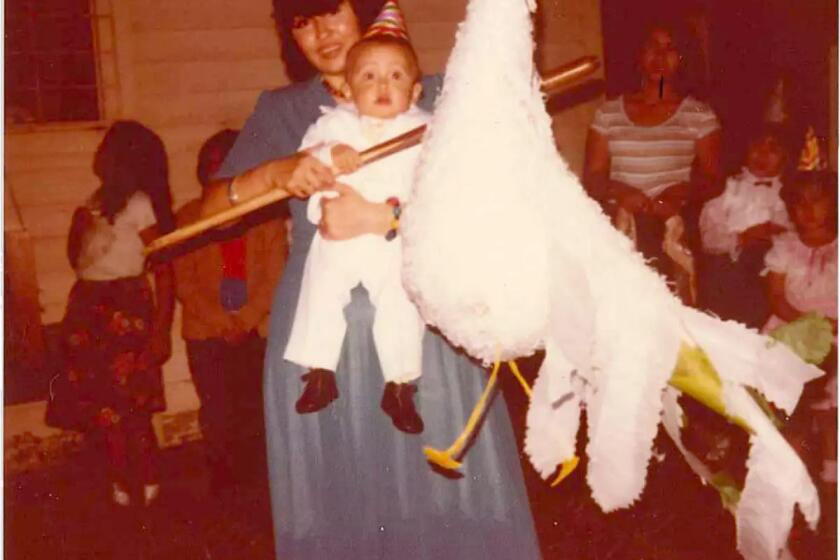It’s Called Change Counseling : Troubled Pioneer Maintains His Faith in Program
Elden Buck dropped out of Cal State Los Angeles, said goodby to his mother, and headed east four years ago. His destination: Reading, Pa.
Elsewhere at the same time, Sam Giumento was bidding farewell to friends in Rochester, N.Y., and Tim Carpenter was packing his bags in New Orleans. They too were bound for Reading.
Buck, Giumento, Carpenter and dozens of other young men journeyed to Reading between 1980 and 1986, taking minimum wage jobs to support themselves and renting rooms at the YMCA. They made these big changes in their lives on the advice of hometown ministers who told them there was a man in Reading who could save them--a man who could change them from gay to straight.
Relies on Insights
Colin Cook, a former Seventh-Day Adventist minister, is the best-known figure in the gay-to-straight movement nationwide. Cook’s renown has spread through his books, cassette tapes, and speaking engagements; dozens of change ministries, as they are called, have grown up around Cook’s technique, which incorporates religious and psychological insights he claims to have used to deliver himself from homosexuality.
Upon their arrival at Cook’s Quest Counseling Center in Reading, Buck and the others met a man much like their religious advisers had described, a man who did indeed seem to be changed. The formerly gay man now was a married man with a baby (today, Colin and Sharon Cook have two children).
But one by one, those who came for help found that Cook was not the man to heal them after all.
“Every private counseling session started with a hug,” said Greg, one of Cook’s former clients, who does not wish to be identified by his real name because his employer doesn’t know he is gay. “Not a hug like when you say goodby to Uncle Bill, but a full body hug where you felt him (Cook) pressing against you.”
Ron Lawson, a sociology professor at Queens College in New York, reported in a series of interviews with Quest counselees that Cook routinely engaged in erotic hugs and nude massages with his clients. The sessions sometimes resulted in mutual masturbation, according to those interviewed.
Eleven of the 14 former Quest members interviewed by Lawson said they had been the target of sexual advances by Cook. In addition, Lawson talked to change candidates who said they were molested by Cook when he was on his frequent out-of-town trips to speak to various groups about freedom from homosexuality.
When Lawson sent a 13-page letter on his findings to 28 leaders of the Seventh-Day Adventist Church last October, Cook, 47, confessed to the acts. Last December, Cook ceased counseling his clients. In June, the Quest Counseling Center closed.
“I have been very frank and very open about my failures,” Cook said in a recent interview at his home near Reading.
Cook said he “fell into the delusion” that the nude massages and such were a legitimate component of his counseling activities.
“I allowed myself to hug and hold my counselees thinking I was helping them,” he said. “But I needed it more than they did.”
The counselor has since begged the forgiveness of his counselees and the Seventh-Day Adventist Church. The church, which used to contribute about $47,000 a year to his ministry, has withdrawn financial support from Cook, church spokesman Robert Dale said.
But, except for the withdrawal of funds, the Cook drama seemed to pass barely noticed by the church and the community.
In a letter to the Adventist Review, the major newsletter of the church, former Quest client Greg castigated the editor for not reporting Cook’s downfall and thus failing to warn others away from the counselor. “Church monies were used for the rape of individuals,” he wrote. Greg said later that the clients each paid $30 for weekly sessions.
‘He’s Been Disgraced’
William Johnsson, editor of the Adventist Review, said they did not cover the story because they had never reported on Cook in the past and they did not wish to harm him further. “He’s been disgraced, really,” Johnsson said.
In addition, the secular media didn’t appear interested in what had happened in Reading, either, Greg said. “It seemed like it was big enough to be on the evening news, but I guess there’s a double standard,” he said. “We (gays) seem to be a little less human.”
The fact that the Cook matter caused so little stir except among those immediately involved seems to have set the stage for Cook’s return.
“He has been slowed, but not diverted,” said sociologist Lawson, who presented a paper on the issue called “The Quest Learning Center/Homosexuals Anonymous: Trouble in an ‘Ex-Gay Ministry’ ” at a meeting of the American Sociological Assn. in Chicago last August.
The September issue of an international journal for Seventh-Day Adventist ministers announced that Cook will soon resume his counseling work. In a journal article, Cook publicly reiterated his faith in the change process and in his own work. Someday in the future, he said he expects to see “a thousand Christian psychiatrists, psychologists and ministers . . . committed to the truths that Quest has espoused.”
Church spokesman Dale said that, although the church no longer officially endorses Cook, it does intend to “redouble” its efforts to aid individuals who wish to convert from gay to straight.
Why is the church so determined to promote change as an option? Lawson has examined the question in the course of researching a book he is writing on the social history of Adventism. He said the Seventh-Day Adventist church and other conservative denominations have seized upon change ministries as an answer to the problem of how to minister to homosexuals in their midsts.
Believing that homosexuality is sinful, such churches cannot embrace gays, he said. Yet they don’t wish to appear unresponsive to the needs of the homosexuals in their congregation, he added.
“The obvious response,” Lawson said, “is to cure them.”
When he heard about the scope of Cook’s transgressions, Elden Buck said he spent several days “walking around on the edge of town, because I didn’t believe anymore. I was questioning the entire Christian faith. I felt a deep fear that I would never be able to trust anyone again.”
The reactions of the counselees to Cook’s abuses followed a similar pattern: a loss of faith, loss of trust in other human beings, and a lack of motivation to get on with their lives. Many of them remain in Reading, and say they are unwilling or unable to go home to families who expected them to be changed.
Some pro-gay groups regard this situation as an example of just what they feel is wrong with the concept of change ministries. Marsha Langford, a Los Angeles therapist who is on the board of directors of the Seventh-Day Adventist Kinship organization (a gay and lesbian religious group), said that what happened in Reading shows that change ministries promise something they can’t deliver.
“It (change) doesn’t work,” she said. “They’re trying to do something that isn’t natural for them. It’s similar to when the Roman Catholic Church said people who were left-handed should become right-handed because it was the one natural state of being.”
Not only does the foiled attempt wreak emotional havoc with the change candidates themselves, she said--Sam Giumento said the counselees “left Quest feeling like we had failed”--but women also are victimized by the ministries when men who are trying to convert marry in an attempt to hurry the process.
Wives of so-called ex-gays end up “in relationships with men who don’t love them,” Langford said. In addition, she said, the wives can be at risk for AIDS due to their husbands’ prior homosexual contacts--or current contacts, in the case of those who continue clandestine homosexual activity.
Her concerns were expressed to Cook, who said that he has not been tested for AIDS.
Ralph Blair, a psychotherapist in New York City and the author of a booklet exposing self-proclaimed “changed” individuals who have returned to a gay life style, said of the change ministries: “I think they are bad psychologically, and I think they are bad theologically.”
Clients of these ministries who are unable to change often resort to promiscuous relationships, he said, which not only reinforces their low self-esteem but is decidedly risky behavior in a time of AIDS.
The disillusionment that can result when an attempted change fails has resulted in depression, self-hatred, and at least one suicide that he knows of, he added.
Born and raised a devout Seventh-Day Adventist in a suburb of Philadelphia, Greg’s sexual orientation was so unacceptable to him that at 12 or 13, he said, “I made a vow to myself that I would never tell another human being.”
He broke that vow to confess to Cook, after hearing Cook speak in his church. “In six months,” Greg said Cook told him in a counseling session, “you will be able to feel change. At the end of the year you will have feelings for the opposite sex.”
With visions of marriage occupying his imagination, Greg was relieved. “This is what I wanted to hear,” he later said.
But before long, the hugs began. Greg hated them, he said, but found that if he went along with the idea, Cook wasn’t so persistent.
Later, Greg said, Cook began showing him magazine pictures of men in underwear. Like the others in the program, he often felt uneasy with Cook’s demands, but submitted anyway. Over time, the advances became harder to ignore, Greg said.
Giumento explained their reactions this way: “I figured, he’s a counselor. He knows what he’s doing. I understood that we were just being paranoid.”
Away from Cook’s office, Greg found that the program seemed to be having the opposite of the desired effect.
Many of the counselees were having sexual encounters with each other, he said. When they felt lonely, they visited the gay bars in town.
Although he had never had a homosexual experience before he came to Quest, Greg said, he eventually found himself in a relationship with another counselee. And a small voice inside him began drowning out the opinions he’d heard all his life. “I don’t really want to change,” he remembers thinking. “For the first time in my life I love another human being. I can’t see the sin in it.”
Ironically, 11 of the 14 counselees interviewed by Lawson said that--like Greg--Cook’s program ultimately led them to accept their homosexuality.
Sharon Cook nestled her son Christopher, 6, under one arm, held 2-year-old Brendan under the other and read the boys a story before she sent them off to their baby sitter.
There was a fire burning on the hearth of the Cooks’ duplex in a village outside Reading. The room was unkempt and reassuringly domestic. The furniture was poorly matched.
Seated on the couch an arm’s length from his wife was Colin Cook, a slightly built man who easily draws people with his non-threatening manner and engaging grin. He walks with a limp, the result of childhood polio.
He met his wife through a friend’s matchmaking efforts.
Said Sharon Cook: “I did not fully realize how difficult it was going to be.” She was referring to her husband’s homosexual affinities. “I thought it was in the past. Certainly, I should have asked a lot more questions.”
For the first four years of their marriage (they have been married for eight), Sharon said, she believed Colin was changed. They shared a dedication to his theories, and Sharon counseled the small number of women who come to Reading seeking freedom from homosexuality. (Those in the field say change ministries attract far more men than women, for a variety of sociological reasons.)
In the fourth year, Cook confessed to his wife “a fall.” Later he added that he had given in to temptation in “bookstores (gay bookstores selling pornography) and bathroom places.”
It was only when word of the scandal broke that Sharon learned that her husband had been deceiving her all along.
“I should have told Sharon before I married that I was still having occasional falls,” Cook said. Sharon withdrew from the conversation at this point and let her husband do the talking.
“The biggest hurt (to her) was not that I fell, but that I didn’t tell her,” he added.
Cook says this is not the first time he has faced a personal crisis because of his homosexual impulses. Born in England, the son of a fisherman, Cook was a minister in Great Britain for four years, then came to New York City at 31 where he continued his ministry.
He was engaging in anonymous homosexual acts at the time, he said, and decided to step down from his post before risking “final exposure.”
Cook proceeded to manufacture his own cure for the condition that was keeping him from his profession. The solution consisted of the acknowledgement that he was heterosexual in God’s eyes--no matter what his inclinations, he said. “Man was created in the image of God, male for female,” Cook said. “I am created as a heterosexual person.”
Cook also ascribed to a theory that the longing for a close relationship with an emotionally distant same-sex parent is largely the cause of homosexuality. Since his father was so often away at sea while he was growing up, Cook believes he attempted to fill that gap by having sex with men.
Cook went on to share what he had learned with others who were troubled by their homosexuality. He formed Homosexuals Anonymous, a self-help organization with 60 chapters across the country. Cook’s teachings also tied him closely to Exodus International, an international change organization that operates about 40 groups, including Desert Stream in Santa Monica.
Despite his growing renown as a spokesman for the ex-gay movement, Cook still had feelings for men. Three months after he was married, he said, he and his wife were making love and he began crying. “I felt nothing,” he said. He was terrified that the change process was not working.
Eventually, Cook said he embraced the idea that people undergoing change might still have same-sex fantasies, longings and slip-ups. “I don’t think you’ll ever find anybody that feels they’ve totally arrived,” he said. “I want to be both hopeful and cautious. This is no easy journey, but is a journey full of hope.”
Cook, who often refers to himself as a “pioneer” of the change movement, denied a request to put a reporter in touch with men who have been healed of homosexuality by his method. His detractors say he doesn’t have any real successes; Cook says he is merely trying to protect his clients from the insensitivity of skeptics.
Sharon Cook said that she continues to have faith in her husband’s ability to change. She feels confident that Colin Cook will not fall again as he resumes his ministry, she said, because he is seeing a clinical psychologist and he will be accountable for his behavior to three elders in his church.
Cook said the work he is doing toward his own change is paying off. In the year since his public fall, he has maintained “sexual sobriety,” he said, and added that “99.9%” of his fantasies involving male partners have vanished.
More to Read
Start your day right
Sign up for Essential California for news, features and recommendations from the L.A. Times and beyond in your inbox six days a week.
You may occasionally receive promotional content from the Los Angeles Times.






